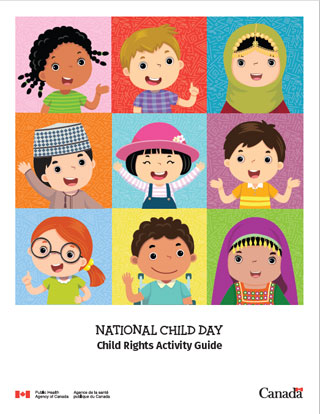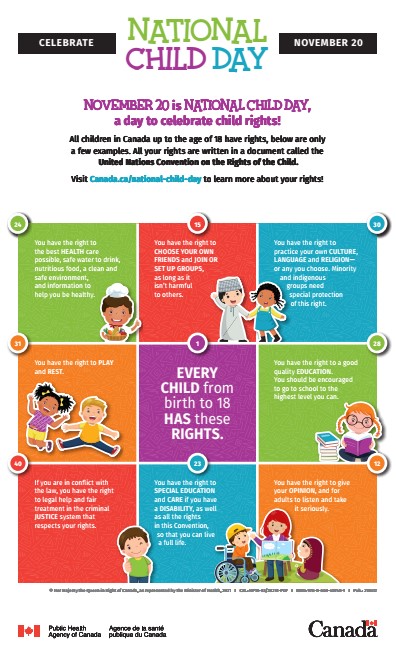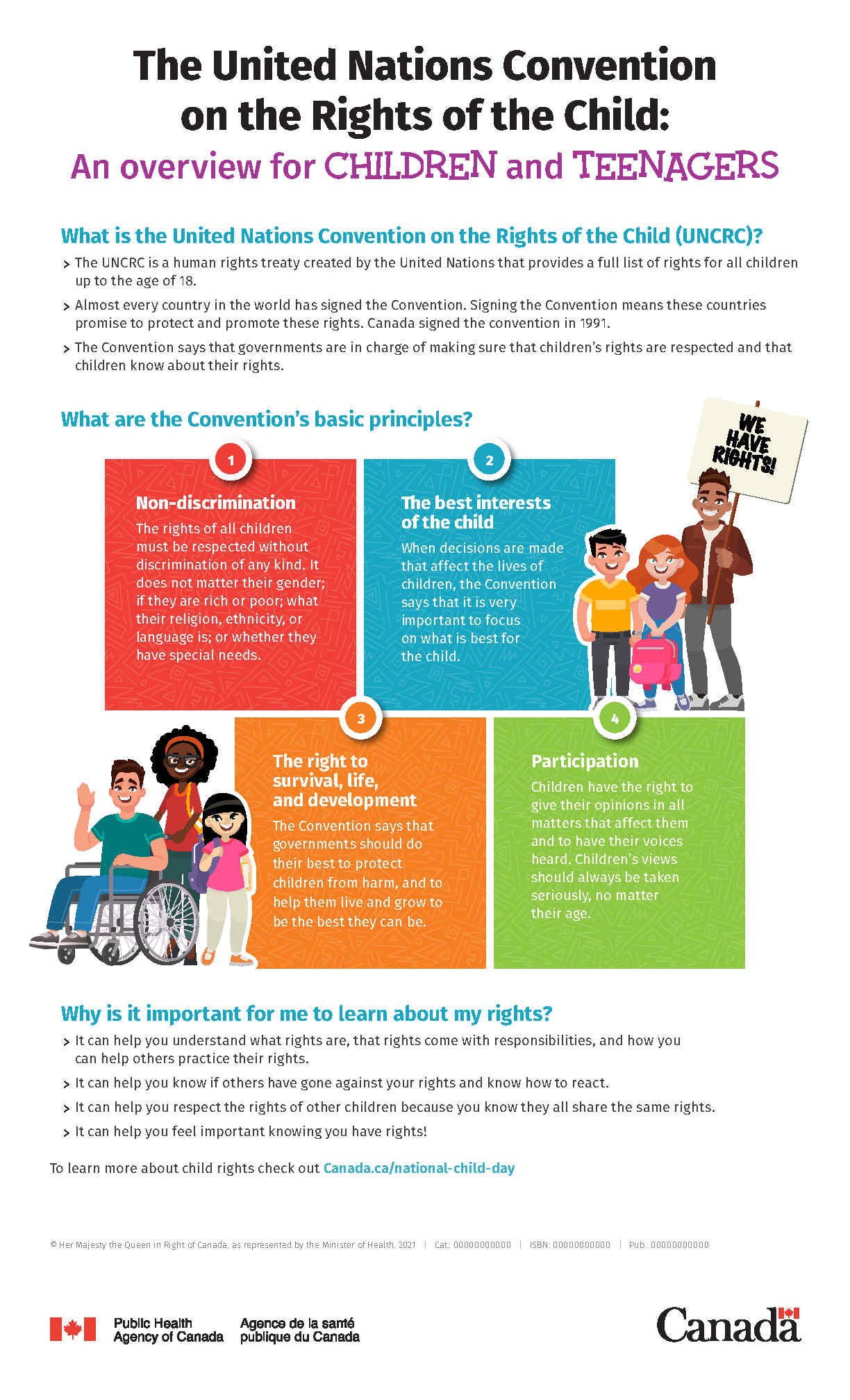National Child Day
On this page
About
It's about celebrating children as:
- active participants in their own lives and in their communities
- active citizens who can and should meaningfully contribute to decisions that affect their lives
The United Nations adopted the Convention on the Rights of the Child (CRC) on November 20, 1989. Canada joined in 1991, making a commitment to ensure that all children are treated with dignity and respect and have every opportunity to reach their full potential. This commitment includes:
- protecting children from harm
- ensuring children's basic needs are met
- providing children opportunities to have a voice (speak out and be heard)
Learn more:
How to celebrate
National Child Day is an excellent opportunity for educators, parents and caregivers to teach children about their rights. Here are some ideas on how to celebrate:
- Step 1: Play 1 of the videos below about child rights. There are 2 sets of videos: one for children and one for teenagers, in English and French.
- Step 2: Organize a learning activity using the child rights activity guide or our activity selector tool. The activity guide provides various activities that teachers, educators or group leaders can use with children or teenagers. There are also many ideas to inspire children and youth to lead activities on their own. Our activity selector tool can help you quickly choose an activity from the guide based on categories and age group.
- Step 3: Keep the conversation going! Guide meaningful conversations with children and youth by encouraging them to continue to learn more about their rights. You can discuss our factsheets, print copies of our colouring page, research child rights educational toolkits or browse through the additional resources on children rights.
- Step 4: Promote the importance of National Child Day by spreading the word within your network and on social media using #NationalChildDay. Together we can raise awareness and advocate for the rights and well-being of children everywhere.
Access the:
Featured resources

Video created by youth, for children of approximately ages 6 to 12.

Video created by youth, for children of approximately ages 13 to 17.

List of activities that teachers, educators or group leaders can use with children or teenagers.

An overview of some of the articles from the CRC.

An overview of the CRC for children and teenagers.
Additional resources
Below you'll find information and links to resources for everyone, including children, teenagers, parents and caregivers, and educators.
For everyone
By increasing awareness of children's rights, you can help to promote and improve the health and well-being of children and adolescents in Canada.
UNICEF Canada: About the Convention on the Rights of the Child
Learn more about the CRC, watch videos and access UNICEF's colourful printable child-friendly version of the CRC.
Children First Canada: National Child Day
Find information about events being planned to celebrate National Child Day and Children First Canada's colourful printable child-friendly version of the CRC. You can also learn about the Young Canadians' Parliament.
Society for Children and Youth of BC: Child Rights Resources
This website contains resources that are relevant for all Canadians (not only residents of BC) including posters, booklets and printable worksheets for students in kindergarten to grade 7 to complete at school or with their parents.
International Play Association: The Child's Right to Play
Learn about the importance of play in this video "This is Me: Article 31 and a Child's Right to Play" and this poster which provides an overview of Article 31 (The right to play).
UNICEF Convention on the Rights of the Child videos (hosted on YouTube)
A series of videos depicting some of the rights set out in the UN Convention of the Rights of a Child.
UNICEF Australia: Learn About Child's Rights
UNICEF Australia webpage with an overview on the rights of children. Check out the opening video titled: What are Child's Rights?
For educators
Canadian Coalition for the Rights of the Child: Resources
Various educational resources including fact sheets introduce some of the basic principles of the CRC.
Equitas: Tools for Children
Children's Rights Leadership Cards and a "Play It Fair! Toolkit" for children 6 to 12 and a "Speaking Rights Toolkit" for youth aged 13 to 18.
GlobalChild: Educational cards
Child-friendly cards that were created to help educate children about their human rights.
National Film Board: Child Rights
The following four short films are available to all viewers: An Artist, Ex-Child, Overdose, Every Child. There are also many other videos available only with a subscription to CAMPUS.
Government of Canada: Human Rights
Know your rights as a Canadian citizen, understand how your rights are protected, and learn how to file a complaint if you have been discriminated against. You can also learn about legislation and other conventions that protect the rights of specific communities and groups, including people with disabilities, Indigenous People and LGBTI persons.
A Path to Dignity: The Power of Human Rights Education
A 28-minute movie that presents 3 stories illustrating the impact of human rights education.
Teaching Human Rights: Practical activities for primary and secondary schools (PDF)
A guide book created by the United Nations Office of the High Commissioner for Human Rights for teachers and other educators which includes learning activities for primary and secondary school children.
Alberta National Child Day Coalition
This website has useful information for educators across Canada, not only in Alberta. Check out a video featuring a rap song about child rights, access resources and toolkits, learn about how and why National Child Day is celebrated, and see a list of events happening this year!
Canadian Child Care Federation: Child Rights
A blog series related to child rights, including an article on how to celebrate National Child Day, and an article on behaviours that demonstrate respect for the rights of children.
Tips for Adults on Engaging Youth through Social Media
Check out these tips developed by youth via The Students Commission of Canada.
For children and teenagers
As a child under the age of 18, you have special rights, and these rights are protected by the United Nations Convention on the Rights of the Child (CRC). The CRC exists to help you have a happy childhood and help you grow up to be your best. Your rights include:
- to be protected: from abuse, neglect and exploitation
- to basic care: such as having food and shelter
- to be heard: to participate in decisions that affect you
- to know and understand your rights!
Government of Canada: Information on family violence for children and youth
Government of Canada website for children and youth to learn what family violence is and how to get help.
For parents and caregivers
As a parent, you play an important role in the healthy development of your child. You have the main responsibility to raise your child and as such, it is important for you to understand your child's rights.
Government of Canada: Human Rights
Know your rights as a Canadian citizen, understand how your rights are protected, and learn how to file a complaint if you have been discriminated against. You can also learn about legislation and other conventions that protect the rights of specific communities and groups, including people with disabilities, Indigenous People and LGBTI persons.
Government of Canada: Healthy Living
Information about a variety of topics to keep your children safe and healthy.
Government of Canada: Youth Justice
Learn about the Youth Criminal Justice Act, which provides the legislative framework for a fairer and more effective youth justice system.
Government of Canada: Family Law
Information for families experiencing separation and divorce, including how decisions about parenting after divorce must take into account the best interests of a child and a Child's Views and Preferences. For resources to support children affected by separation or divorce, see What Happens Next: Information for kids about separation and divorce and Because life goes on … helping children and youth live with separation and divorce.
Government of Canada: Cyberbullying information for parents
Information on what is cyberbullying, how to prevent it, and what to do if it happens.
Government of Canada: Get Cyber Safe
National public awareness campaign created to inform Canadians about cyber security and the simple steps they can take to protect themselves online.
Canadian Centre for Child Protection: Protect Kids Online
Learn how to keep your children safe online and teach them about internet safety.
Tips for Adults on Engaging Youth through Social Media
Check out these tips developed by youth via The Students Commission of Canada.